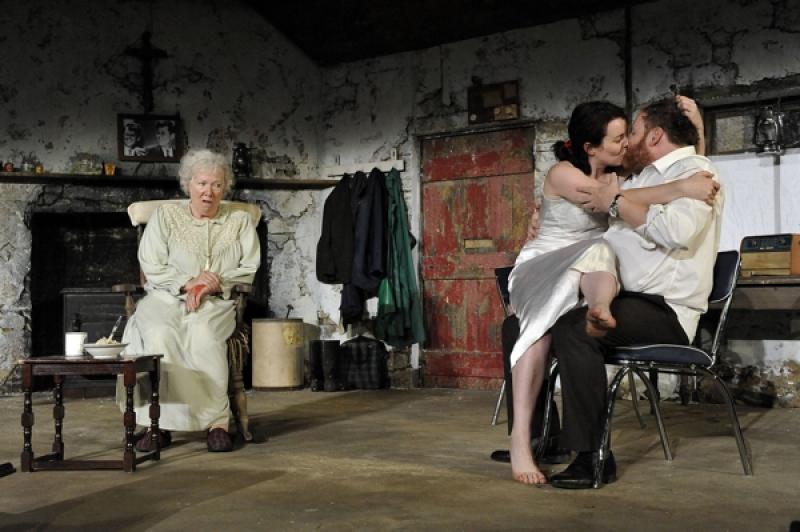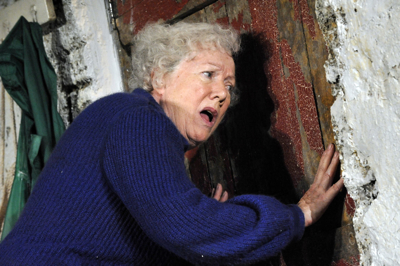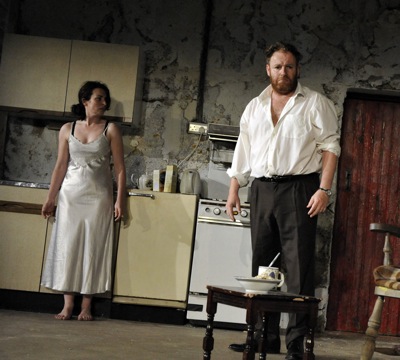The Beauty Queen of Leenane, Young Vic | reviews, news & interviews
The Beauty Queen of Leenane, Young Vic
The Beauty Queen of Leenane, Young Vic
Some daughters do 'ave 'em - McDonagh's mother from hell returns

The Martin McDonagh phenomenon is a curious one. He burst upon the world in 1996, aged 26, born in Camberwell, the son of Irish parents. The quirk of fate that placed him in south east London may or may not have been the making of him. But by pure accident, and whether he actually knew the people involved or not, it aligned him with what was to become the abiding zeitgeist of the mid-Nineties: BritArt and Damien Hirst and Tracey Emin.
And so it is with McDonagh. In Joe Hill-Gibbins’s production, you marvel at the way McDonagh over and over again produces if not white rabbits out of a hat at least something akin, though bloodier. Like Pinter, he is a master of juxtaposition, the inane with the cruel. Timing is all.
 Take this innocuous little speech from the mother of all mothers, Mag Folan (Rosaleen Linehan, left), to her unmarried 40-year-old daughter, Maureen: “Did you meet anybody on your travels, Maureen? Ah no, not on a day like today. (Pause) Although you don’t say hello to people is your trouble, Maureen. (Pause). Although some people it would be better not to say hello to. The fella up and murdered the poor ol’ woman in Dublin and he didn’t even know her... (Pause) Strangled, and didn’t even know her.”
Take this innocuous little speech from the mother of all mothers, Mag Folan (Rosaleen Linehan, left), to her unmarried 40-year-old daughter, Maureen: “Did you meet anybody on your travels, Maureen? Ah no, not on a day like today. (Pause) Although you don’t say hello to people is your trouble, Maureen. (Pause). Although some people it would be better not to say hello to. The fella up and murdered the poor ol’ woman in Dublin and he didn’t even know her... (Pause) Strangled, and didn’t even know her.”
Now, you don’t know whether to laugh or cry at the pure idiocy of it. But the Young Vic’s opening night audience simply couldn’t believe their luck. They guffawed, they rocked and hugged McDonagh’s play to them.
Either they were being taken completely by surprise; or like Pinter, McDonagh’s reputation had gone before him (he is now the proud owner of an Oscar for his short film, Six Shooter, as well as 2008 BAFTA award-winner and Oscar nominee for the screenplay of his first full length feature movie, In Bruges). Leastways, the audience were determined to laugh at anything that even faintly resembled a joke. It was as if they had suddenly transposed themselves into a Shakespeare’s Globe crowd where spectatorship has now become an art form and audiences take positive possession of a play. Wondrous to behold, theatre participation in action.
And they weren't just laughing at McDonagh’s satirical jibes. When it came to moments of empathy, the sympathy was equally generous; it came in waves, in bucketloads, all very heart-warming. Yet, for those of us who had seen The Beauty Queen of Leenane originally at the Royal Court, unfortunately, doubts linger.
McDonagh is a writer of bitter cross-fertilisation. "Tarantinoesque" has frequently been said of him as he kicks out at his Irish roots with a ferocious comic intensity. In Beauty Queen, set on the west coast deep in rural Ireland, he takes the stock Irish “mam” and turns her into the mother from hell, a woman of small-minded selfishness so extreme she will do anything to keep her daughter under her thumb, be it burning letters or reminding a suitor of her daughter’s mental breakdown in England. The games she employs - one minute beseeching, the next snarling - are only too recognisable to anyone who has felt family buttons being pushed.
In Druid Theatre’s original production, directed by Garry Hynes, the dingy cottage and its inhabitant Mag, as played by the monumental Anna Manahan, spoke of twisted spiritual as well as economic impoverishment. Hypocrisy clung to those peeling distempered walls like spattered grease. That sense of national as well as personal decay is somehow missing from Hill-Gibbins’s production in Ultz’s clever but too-open, immersive design – you enter through rain and turf to a Young Vic auditorium cut into a triangular staging. The effect softens McDonagh's intention and draws out unusually large swathes of compassion from this darkest of observers.
 The disgust - Mag’s chamber pot emptied into the kitchen sink – and the violence – scalding with hot fat, a poker-beaten death – are also nullified by Susan Lynch’s attractive Maureen. Here is a 40-year-old who should appear like one whose life has been almost sucked out of her. Lynch, a terrific actor, is altogether too together, though her one moment of sexual joy with David Ganly’s appealingly awkward Irish “navvy” suitor, Pato, is genuinely moving. (Right, Lynch and Ganly)
The disgust - Mag’s chamber pot emptied into the kitchen sink – and the violence – scalding with hot fat, a poker-beaten death – are also nullified by Susan Lynch’s attractive Maureen. Here is a 40-year-old who should appear like one whose life has been almost sucked out of her. Lynch, a terrific actor, is altogether too together, though her one moment of sexual joy with David Ganly’s appealingly awkward Irish “navvy” suitor, Pato, is genuinely moving. (Right, Lynch and Ganly)
Indeed, groans, gasps and claps accompanied Pato’s loving letter to Maureen, sent from England inviting her to join him in America in Boston, which is destined never to reach her. He doesn’t know, but we know and the inevitability of Maureen’s last chance of happiness being snatched away gives the play its ready pathos.
And still the jokes keep coming. And Rosaleen Linehan – a definitive Winnie in Beckett’s Happy Days - presides over it all with eye-watering vindictiveness and eye-narrowing watchfulness. She gives a master-class in restrained potency as McDonagh tightens the screws using that most classic of tactics: pre-cognisance, letting audiences in on a fate that the characters have yet to discover for themselves.
All in all, a fine if too genteel revival that somehow feels more akin to a soft-focused Brian Friel night out than a wilful, wildly savage melodrama.
Explore topics
Share this article
The future of Arts Journalism
You can stop theartsdesk.com closing!
We urgently need financing to survive. Our fundraising drive has thus far raised £49,000 but we need to reach £100,000 or we will be forced to close. Please contribute here: https://gofund.me/c3f6033d
And if you can forward this information to anyone who might assist, we’d be grateful.

Subscribe to theartsdesk.com
Thank you for continuing to read our work on theartsdesk.com. For unlimited access to every article in its entirety, including our archive of more than 15,000 pieces, we're asking for £5 per month or £40 per year. We feel it's a very good deal, and hope you do too.
To take a subscription now simply click here.
And if you're looking for that extra gift for a friend or family member, why not treat them to a theartsdesk.com gift subscription?
more Theatre
 Little Brother, Soho Theatre review - light, bright but emotionally true
This Verity Bargate Award-winning dramedy is both entertaining as well as thought provoking
Little Brother, Soho Theatre review - light, bright but emotionally true
This Verity Bargate Award-winning dramedy is both entertaining as well as thought provoking
 The Maids, Donmar Warehouse review - vibrant cast lost in a spectacular-looking fever dream
Kip Williams revises Genet, with little gained in the update except eye-popping visuals
The Maids, Donmar Warehouse review - vibrant cast lost in a spectacular-looking fever dream
Kip Williams revises Genet, with little gained in the update except eye-popping visuals
 Ragdoll, Jermyn Street Theatre review - compelling and emotionally truthful
Katherine Moar returns with a Patty Hearst-inspired follow up to her debut hit 'Farm Hall'
Ragdoll, Jermyn Street Theatre review - compelling and emotionally truthful
Katherine Moar returns with a Patty Hearst-inspired follow up to her debut hit 'Farm Hall'
 Troilus and Cressida, Globe Theatre review - a 'problem play' with added problems
Raucous and carnivalesque, but also ugly and incomprehensible
Troilus and Cressida, Globe Theatre review - a 'problem play' with added problems
Raucous and carnivalesque, but also ugly and incomprehensible
 Clarkston, Trafalgar Theatre review - two lads on a road to nowhere
Netflix star, Joe Locke, is the selling point of a production that needs one
Clarkston, Trafalgar Theatre review - two lads on a road to nowhere
Netflix star, Joe Locke, is the selling point of a production that needs one
 Ghost Stories, Peacock Theatre review - spirited staging but short on scares
Impressive spectacle saves an ageing show in an unsuitable venue
Ghost Stories, Peacock Theatre review - spirited staging but short on scares
Impressive spectacle saves an ageing show in an unsuitable venue
 Hamlet, National Theatre review - turning tragedy to comedy is no joke
Hiran Abeyeskera’s childlike prince falls flat in a mixed production
Hamlet, National Theatre review - turning tragedy to comedy is no joke
Hiran Abeyeskera’s childlike prince falls flat in a mixed production
 Rohtko, Barbican review - postmodern meditation on fake and authentic art is less than the sum of its parts
Łukasz Twarkowski's production dazzles without illuminating
Rohtko, Barbican review - postmodern meditation on fake and authentic art is less than the sum of its parts
Łukasz Twarkowski's production dazzles without illuminating
 Lee, Park Theatre review - Lee Krasner looks back on her life as an artist
Informative and interesting, the play's format limits its potential
Lee, Park Theatre review - Lee Krasner looks back on her life as an artist
Informative and interesting, the play's format limits its potential
 Measure for Measure, RSC, Stratford review - 'problem play' has no problem with relevance
Shakespeare, in this adaptation, is at his most perceptive
Measure for Measure, RSC, Stratford review - 'problem play' has no problem with relevance
Shakespeare, in this adaptation, is at his most perceptive
 The Importance of Being Earnest, Noël Coward Theatre review - dazzling and delightful queer fest
West End transfer of National Theatre hit stars Stephen Fry and Olly Alexander
The Importance of Being Earnest, Noël Coward Theatre review - dazzling and delightful queer fest
West End transfer of National Theatre hit stars Stephen Fry and Olly Alexander
 Get Down Tonight, Charing Cross Theatre review - glitz and hits from the 70s
If you love the songs of KC and the Sunshine Band, Please Do Go!
Get Down Tonight, Charing Cross Theatre review - glitz and hits from the 70s
If you love the songs of KC and the Sunshine Band, Please Do Go!

Add comment